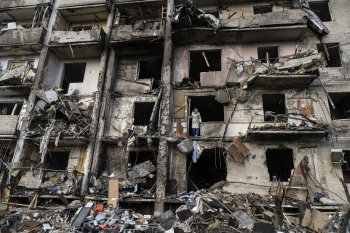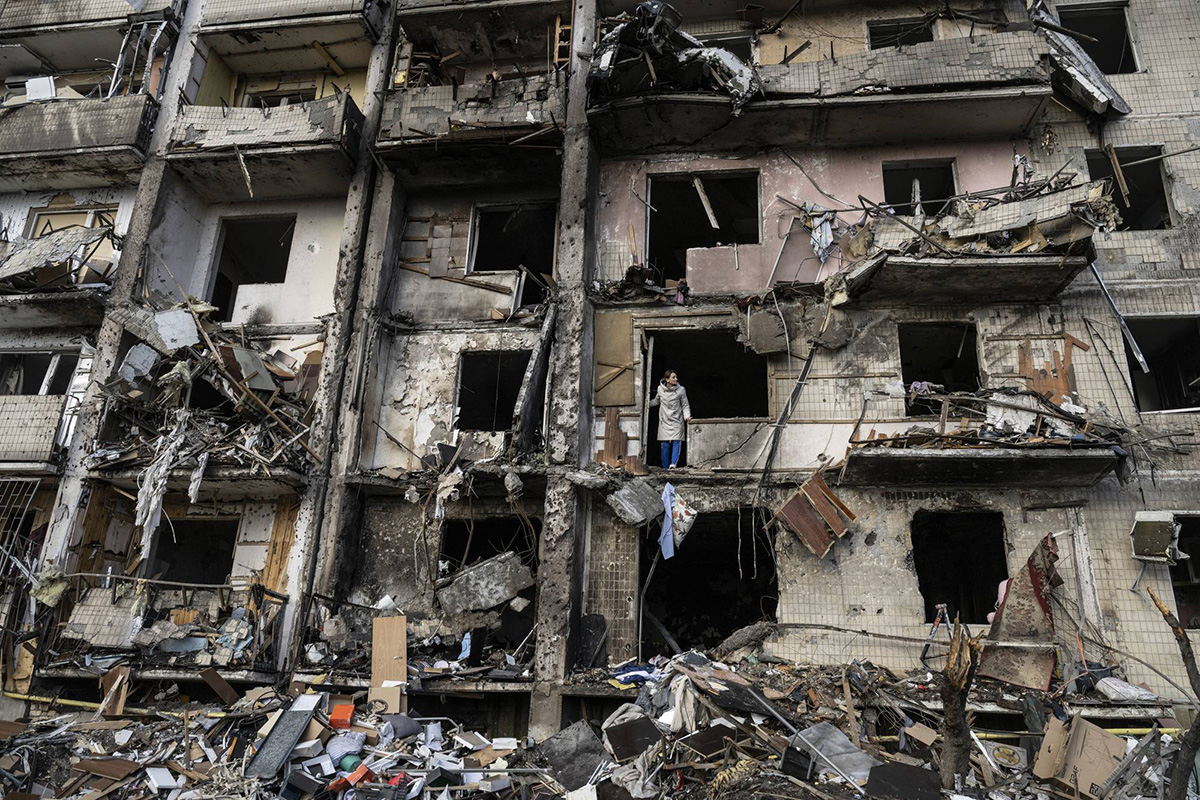
.jpg) Dr. George Arickal
Dr. George Arickal

"Never again a war" -- this was the longing of countless European people after the Second World War. But a horrible war is raging now in Europe. The aggressor and the immediate victims of this severe crime are well kown to us; the indirect victims are to be found today or tomorrow in all countries. This attack on a sovereign nation like Ukraine is an attack on the right to self-determination, democracy, sovereignty and freedom of people.
Much has been analyzed and argued about the background and causes of this war, but nothing, absolutely nothing, can justify the cold-blooded murder of completely innocent civilians such as women and children. There are no winners in a war, only the first and second losers. Even if Russian President Vladimir Putin wins this battle against humanity, the Russian Federation will be registered in the world history as the moral loser.
The Russian President and his regime are undoubtedly the accused in the world court of justice. But there are also other powers hiding themselves behind this war as innocent lambs. The exposure of this game of hide-and-seek may be misundersood as a justification of Putin's aggression; however, it is necessary in order to be able to learn from history and draw the consequences for a peace strategy in the future. It's time to look at the developments from different angles and to call things by their clear names.
When the Berlin Wall fell and the German reunification was achieved, a process of dissolving the Warsaw Pact began under the leadership of the Soviet Union. With this important historical turning point in the 1990s, many believed that the "Cold War" and the East-West competition in the armament came to an end. The atmosphere in the western sphere was very promising and enthusiastic; the longing for peace got wings again. It was felt that the time had come to stop the spiral of armament and to devote the world's resources at the service of life. There was even the talk of accruing peace dividends.
Unfortunately, the "European Spring" did not last long. The peace dividends were quickly used up because no one was willing to invest in peace. With the collapse of the Soviet Union and the dissolution of its military alliance against the West, one could have expected that the Western military alliance NATO, led by the USA, would dissolve or at least the pace of armaments would be slowed down in favor of a peaceful coexistence of nations. Instead, NATO continued its expansion towards Eastern Europe by including several countries, which were previously allied in the Warsaw Pact. The argument that individual countries have the right to freely decide whether or not to join a military alliance sounds plausible. However, it is the right and even the duty of an alliance to examine whether such accession serves peace in the region.
It may be recalled that during the negotiations on German reunification, a mutual understanding was reached between the then General Secretary of the USSR Mikhail Gorbachev and Western negotiating partners regarding NATO's renunciation of eastward expansion.
The US having then a monopoly on world leadership did not feel the need to honour such agreements, especially since Russia under President Boris Yeltsin was too weak to resist.
As a matter of fact, NATO's eastward expansion to Russia's borders is a humiliation and provocation for a country like Russia which believes to be a world power. This does, however, in no way justifies the invasion of Ukraine. The historical review gives just an indication that this war could have been avoided, especially since there was no lack of warnings.
The whole world stands with the innocent victims in Ukraine, no matter what position national governments take in this conflict. An admirable wave of solidarity is visible everywhere, especially in the Western world. Refugees are received very generously. With this war, President Putin managed to bring the world community, especially the European Union and NATO, together as closely as possible. The chair of the world leadership has long been vacant and now the world leaders are clustering around US President Joe Biden.
Russia's closest partners found themselves in a dilemma in taking a clear position in the conflict. China, India and Pakistan abstained from the resolution condemning Russia in the UN Security Council and the UN General Assembly. China’s voting was anyhow expected. India's abstention, on the other hand, brought bitter disappointment to many. During the debates in the United Nations, India clearly criticized the perpetrator of the invasion, but for various reasons Delhi could not bring itself to condemn Russia. India limited itself to an appeal for an immediate ceasefire and for constructive dialogue between the conflicting parties. At the time of this voting, the Indian government stood under pressure since in major Ukrainian cities around 16,000 students were trapped inside, and Russian help was needed for their rescue. This was, however, not the main reason for India's abstention.
The focus of India's foreign and security policy is dominated by its relationship with China and Pakistan. In all previous armed conflicts with these neighboring states, Russia has stood by India while the USA has supported Pakistan. In such a background, New Delhi and Moscow signed an Indo-Soviet treaty on peace, friendship and cooperation. Russia is still India's largest arms supplier. 60% of India's arms imports come from Russia. This is almost a third of all Russian arms exports. Since the mid-2000s, the Indian government has been trying to reduce its dependence on Russia in the armaments sector and raw materials by diversifying sources of supply and forging new alliances in security policy.
Especially with a view to the competition with China, India is involved in the security and military policy-oriented coalition QUAD (“Quatrilateral Security Dialogue”). Members in this informal coaltion are Australia, India, Japan and the USA. However, this dialogue moves at a snail's pace. The Indian government is still dependent on close cooperation with Russia and India's abstention is therefore understandable from the government's point of view. The case of Germany's non-participation in the widely demanded energy embargo against Russia can be interpreted in a similar way.
The Ukraine war brings trend-setting changes in the power struggle between East and West. The US saw this attack on Ukraine coming and the early announcement of President Joe Biden was amaizing that NATO would not intervene militarily when Russia refrains from an attack on NATO countries. This message was a consoling one for the world, but to Putin it may have seemed like a free license. In the absence of a third war, the NATO countries outside the European continent have little to fear. They are far away from the battle field and they can increase their exports by imposing economic, trade and fiscal sanctions on Russia. These include, for example, the export of liquid gas and the stop of Nord Stream 2.
Due to the increase of armaments worldwide, weapon exports can flourish without accepting the fact that this type of trade is a business with death. A second Vietnam could emerge from the Ukraine war and keep Russia busy for a long time. The severe economic sanctions against the Russian Federation will one day lead to Russia's second collapse after 1990. It can be assumed that this war-related historical turning point heralded the beginning of the end of the East-West conflict. There is, however, no reason for jubilation because the new world power China could emerge itself as the new challenger.
War is never a good advisor. The Ukraine-war has induced spontaneous changes in the minds and heads of many decision-makers in the world. The need for upgrading to ensure defense capability is unequivocally affirmed. The former calls to make peace with lesser weapons fall on deaf ears. The agenda for climate-oriented, energy-related, environmental protection-oriented, development-related and peace-keeping-based policy areas are subordinated to security policy goals. "If you want peace, prepare for war" -- such slogans find an enthusiastic echo. The worldwide armament is accepted, although it destroys the scarce resources that are sorely needed to preserve creation and to create humane living conditions. This war is throwing the mankind back for years. It's time to stop this madness and return to reason and dialogue.